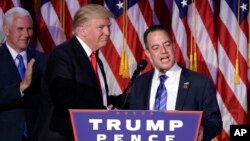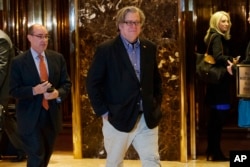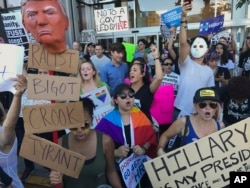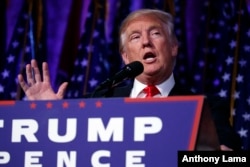U.S. President-elect Donald Trump has presented a clash of visions with his first White House appointments, naming a consummate Washington insider as his chief of staff and a populist, hard-right insurgent as his chief strategist.
Days after his stunning upset victory, the Republican president-elect on Sunday picked Reince Priebus, the party's national chairman and a familiar face in the national capital's political battles, to lead his staff, a reassuring choice for many of the Republican leaders who control Congress. The chief of staff typically controls White House operations, often helping to forge the president's agenda and controlling who gets to see him.
At the same time, Trump named Stephen Bannon, his campaign chief executive, as his top strategist, giving his White House a rabble-rousing edge that Trump's most vocal supporters cheered during the lengthy U.S. presidential race. Before joining the campaign in its final months, Bannon headed the Breitbart News website, which he once described as "the platform of the alt-right," an anti-establishment platform that occasionally has been home to white nationalist and anti-Semitic vitriol.
“I am thrilled to have my very successful team continue with me in leading our country,” Trump said in a statement. “Steve and Reince are highly qualified leaders who worked well together on our campaign and led us to a historic victory. Now I will have them both with me in the White House as we work to make America great again.”
Insider vs outsider
Republican lawmakers praised the choice of Priebus, with one Trump critic, South Carolina Senator Lindsey Graham saying, "It shows me he is serious about governing."
But Bannon's appointment drew immediate attacks from some Republicans and those outside the government.
John Weaver, a long-time Republican strategist, said on his Twitter account, “The racist, fascist extreme right is represented footsteps from the Oval Office. Be very vigilant America.”
Jonathan Greenblatt, chief executive of the Anti-Defamation League, said his group opposes the Bannon appointment because he and "alt-right are so hostile to core American values."
Both Priebus and Bannon dismissed any suggestion that they would not work well on Trump's behalf in the White House.
"Together, we've been able to manage a lot of the decision-making in regard to the campaign," Priebus told NBC on Monday "It's worked very, very well."
Bannon said, "We will have that same partnership in working to help President-elect Trump achieve his agenda."
In Bannon's defense, Trump campaign manager Kellyanne Conway called him a "brilliant tactician" and noted that Bannon served as a U.S. naval officer and has a graduate degree from Harvard, one of the country's most prestigious universities.
Conway said that Priebus and Bannon "complement each other. They both have the most important thing: the ear of the boss.”
Protests
Thousands of demonstrators have taken to the streets in major cities to protest Trump's victory over Democrat Hillary Clinton, shocking to many Americans because pre-election polls suggested the former U.S. secretary of State was headed to election as the country's first female president.
But in an interview on CBS' "60 Minutes" show that aired Sunday night, Trump said of the protesters, "I just don't think they know me."
He told those wary of his presidency, "Don't be afraid. We are going to bring our country back."
Trump laid out some of his initial priorities for when he assumes power on January 20, saying that he will keep his campaign pledges to deport 2 million to 3 million undocumented immigrants in the country who have criminal records, and build a wall along the country's southern border with Mexico to halt the stream of migrants into the United States.
He made it clear he plans, as he said during the campaign, to pursue a right-wing agenda, naming Supreme Court justices who are against abortion and favor gun rights. But he said he was "fine" with another Supreme Court decision opposed by many conservatives, one that legalized same-sex marriage.
Trump, a billionaire real estate mogul about to hold his first elective office, said he would forgo the $400,000 annual salary U.S. presidents are paid, and take $1 as a token wage.
Tina Trinh contributed to this report from New York







